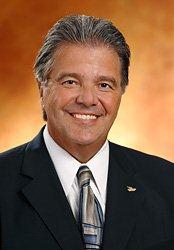After a year filled with speculation and endless possibilities, the search for president of the University of Massachusetts came to a close, as Suffolk alumnus Robert L. Caret was elected to lead the five-campus system. Currently serving as president of Towson University in Maryland, he will fill the shoes of former UMass President Jack Wilson starting July 1.
“I’m a real believer in the fundamentals,” Caret said. “So what we want here is a great education enterprise and a great economic enterprise to make the state a vibrant place to live.”
The UMass Board of Trustees acted as the search committee for the new president, spending the latter half of 2010 selecting the initial candidates. Two weeks ago, three finalists were presented to the board, which had the opportunity to formally meet them each. With the assistance of a hiring agency, the three candidates turned into one president-elect, Robert Caret.
From just the one meeting he’d shown the amount of charisma that a leader of a system like UMass needs,” said UMass Student Trustee Michael Fox, a member of the board. “He also displayed the understanding that increasing state support and awareness is our biggest challenge.”
And Caret is prepared for that challenge. After graduating from Suffolk in 1969, he assumed that the next step was a career as an industrial chemist or teacher. This plan changed after he was encouraged to attend graduate school and earned a PhD in organic chemistry from the University of New Hampshire. From there, he was on the faculty and in administration at Towson for 21 years before leaving for California in to serve as president of San Jose State University.
In 2003, Caret returned to Towson as president, and under his direction the institution benefited greatly. Through mentoring programs and admissions strategies enacted by Caret, Towson’s achievement gap decreased, with the Washington Post citing it as one of very few schools with “little or no disparity in graduation rates between black and Hispanic students and white students.” Achievement is expected to transcend the graduation date and exist throughout students’ lives.
“What I will definitely do in Massachusetts is put in place a system that if we take a student in, we’ll put a support structure around them so that if we take them in, they’ll graduate,” Caret said. “It doesn’t make much sense to take someone in and flunk them out.”
Along with improving graduation rates throughout all UMass campuses, Caret plans to work with local community colleges and students in grades K-12 to ensure that students are coming in prepared and getting their money’s worth. He knows that varying issues will arise on each of the five campuses, and he is ready to take them all on. The plan is to work closely with Gov. Deval Patrick and his staff to “maximize what we’re trying to do.”
“We’re in a world right now, this country in particular, where higher education is viewed as important, but the budget is challenged,” noted Caret. “It’s now becoming less and less affordable, and I’d like to keep it as affordable as humanly possible. In the world I’m living in, I need to work in the political arena as much as the academic arena because with political support comes fiscal support, and it’s critical to our institutions.”
Caret knows the value of a good education, and he attributes some of his success to the education he received at Suffolk. It was during his sophomore year of undergrad when he became truly interested in the intellectual aspect of college, making note of the solid foundation Suffolk provided for the academic career he moved into. He anticipates spending time on Beacon Hill once again.
“Boston is such a unique town, such a vibrant city,” concluded Caret. “I’m a New Englander at heart, and you just feel like you’re coming home again, especially in Boston, which is the hub of New England. It has all the right things going for it. I’m looking forward to it.”







